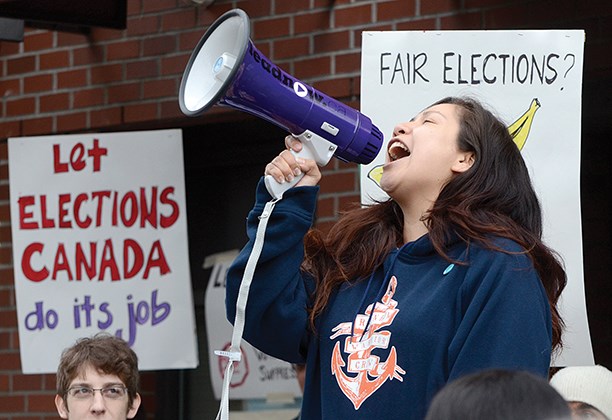Accusations that the Conservative government is trying to disenfranchise voters drew more than 50 protesters to North Vancouver MP Andrew Saxton's constituency office Wednesday.
The protest was part of a larger effort organized by advocacy groups, the Council of Canadians and Leadnow.ca, that saw the groups deliver an 80,000-plus name petition calling on the Tories to amend the Fair Elections Act.
If the bill passes as-is, it will end the practice of vouching for fellow voters who do not have proof of an address and the yellow voter registration cards will no longer be accepted as proof.
That's a calculated move to weed out and suppress voters unlikely to support the Conservatives - youth, seniors, migrants and low- income people, according to protesters. About 120,000 people across Canada used those methods in the last election.
"It's essentially Harper trying to change the rules of the game to win while the rest of us lose. We're here to say this is not a game. This is our fundamental right," said organizer Brigette DePape.
Leadnow organizer Jolan Bailey called Bill C-23 an "appalling attack on our democracy."
"With voter turnout lower than it's been in Canada's history, this is the time when we need to make it easier for people to vote. Not harder. This bill takes us in the wrong direction," he said.
The petition also calls for Elections Canada to have the ability to force party operatives to testify - something aimed at getting to the root of the 2011 robocalls scandal. Instead, the government bill would take the ability to investigate and enforce election fraud away from the agency, and hand it to an independent commissioner.
But Saxton said rather than threaten the integrity of elections, the Fair Elections Act would make it much harder to fraudulently vote more than once or vote in a different riding.
"The whole point of this is to make sure every vote is a legitimate vote," he said noting that fraudulent votes essentially cancel out legitimate ones.
Saxton cited a study carried out after the 2011 election that concluded there were 50,000 cases of "serious problems" in the way people who were vouched for were registered.
"If we didn't do something to help change that, we would be negligent," Saxton said.
Though there isn't any evidence that any of the "serious problems" resulted in fraudulent votes, Saxton said it was almost certain.
"I took probability and statistics in university and I'm sure anybody could say if you've got 50,000 cases of serious problems, then there's got to be some cases of double voting and voter fraud. No question," he said.
Protesters also took issue with the fact Elections Canada will no longer be able to use its advertising budget to encourage voter turnout, but Saxton defends the decision.
"We would love to see voter turnout get higher, but as it is right now, voter turnout has been on the decline for the last number of years so the system isn't working," he said. "The focus here is for Elections Canada to make sure people know when, where, how and what ID they should bring with them in order to vote."



